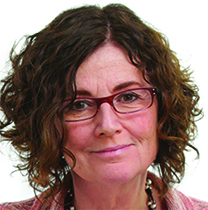Groundbreaking telomere research yields award for de Lange
, professor of cell biology and genetics and director of the Anderson Center for Cancer Research at Rockefeller University, has won the 2018 in honor of her groundbreaking discoveries of the mechanism by which telomeres shield chromosome ends and of the relationship between telomere dysfunction and cancer.

“Our work on telomeres has been a source of excitement and wonder. The mechanism by which shelterin and t-loops solve the telomere end-protection problem combines beautiful simplicity with clever complexity. I am fortunate to have this fascinating subject to study and am deeply honored by this recognition from the ASMB.”
— TITIA DE LANGE
, Vincent Astor professor emeritus of organismal biology and evolution at Rockefeller University, nominated de Lange for this award. “Titia de Lange has almost single handedly solved a major question in cell biology: How do telomeres protect chromosome ends?” Darnell wrote in his nomination letter. “Given the importance of telomere biology in human disease, de Lange’s discoveries have wide implications in the context of human health.”
Since the work of Barbara McClintock and Hermann Muller, it has been known that telomeres allow cells to make the distinction between broken DNA and the natural ends of chromosomes. If DNA repair pathways were to act at chromosome ends, it could cause fusion of one chromosome with another, leading to dramatic deleterious effects, such as chromosome rearrangement, when the cell tries to divide. De Lange’s lab was the first to identify the protein complex shelterin, which binds to the repetitive telomeric DNA. Composed of six proteins, shelterin protects chromosome ends from inappropriate repair or fusion and prevents the activation of DNA damage signaling pathways. Following the discovery of shelterin, her lab used elegant mouse genetics to tease apart how shelterin and its accessory proteins prevent activation of multiple DNA damage repair pathways to keep the chromosome ends intact. Together with at the University of North Carolina, she also used electron microscopy to discover the T-loop structure of telomeres, which is formed by shelterin and hides the chromosome end from DNA damage response pathways.
As a postdoctoral fellow with , de Lange was the first to observe telomere shortening in cancer. Her lab’s exploration of the role of telomere dysfunction in cancer showed that telomere-telomere fusion can lead to catastrophic rearrangement of chromosomes and genomic instability.
, a professor of genetics at Harvard Medical School and investigator at the Howard Hughes Medical Institute, supported the nomination, writing, “What characterizes Dr. de Lange’s work is an instinctual recognition of the unproven assumptions that underlie a field and a daring ability to challenge those assumptions in creative and novel ways. She has truly been a pioneer given to carrying out what on the surface appear to be risky experiments, but what are in actuality a reflection of her tremendous insight into the principles of biology.”
De Lange received her Ph.D. from the Dutch Cancer Institute in Amsterdam, where she worked on trypanosomes in lab, followed by a postdoctoral fellowship at the University of California, San Francisco, studying oncogenes with Varmus.
She joined the faculty of Rockefeller University in 1990 and since has devoted more than 25 years to understanding mammalian telomere function. She was awarded the Leon Hess endowed chair in 1999. She has been elected to the National Academy of Sciences and the American Academy of Arts and Sciences and has won numerous awards and honorary degrees.
De Lange will receive her award during the 2018 ASBMB Annual Meeting. Her award lecture, titled “How telomeres solve the end-protection problem,” will take place at 8:30 a.m. April 24 in Room 6C at the San Diego Convention Center.
Enjoy reading ASBMB Today?
Become a member to receive the print edition four times a year and the digital edition monthly.
Learn moreGet the latest from ASBMB Today
Enter your email address, and we鈥檒l send you a weekly email with recent articles, interviews and more.
Latest in People
People highlights or most popular articles

Biochemists and molecular biologists sweep major 2025 honors
Recent Nobel, MacArthur and Kimberly Prize honorees highlight the power of biochemistry and molecular biology to drive discovery, including immune tolerance, vaccine design and metabolic disease, and to advance medicine and improve human health.

Subramanian receives electron microscopy honor
He delivered remarks at the International Conference on Electron Microscopy in Bangalore, India.

Bioart for fall: From order to disorder
The cover of the fall issue of ASBMB Today was created by ASBMB member, Soutick Saha, a bioinformatics developer at Wolfram Alpha LLC.

Doudna wins Priestley Medal
She will receive a $20,000 research grant and will formally accept the honor at the ACS Spring 2026 conference.

In memoriam: David Baltimore
He was a Nobel laureate, president emeritus at the California Institute of Technology and an ASBMB member for more than 50 years.

In memoriam: Stuart A. Kornfeld
He was a pioneer in glycobiology and was a member of the 麻豆传媒色情片 and 麻豆传媒色情片 Biology for more than 50 years.

